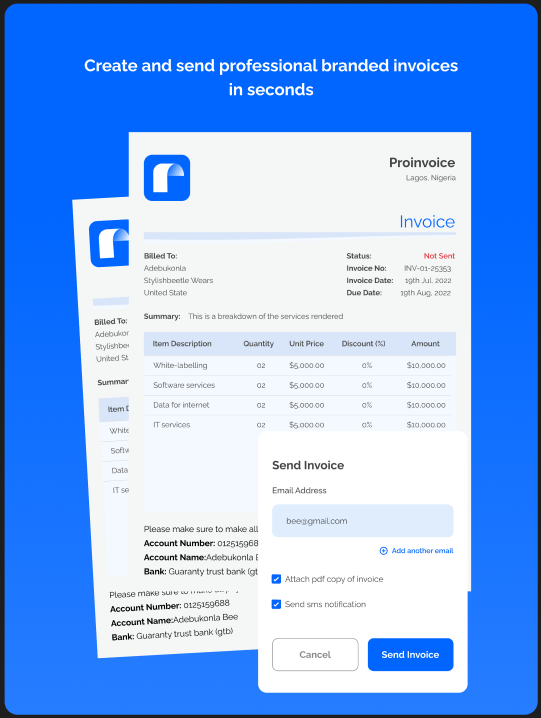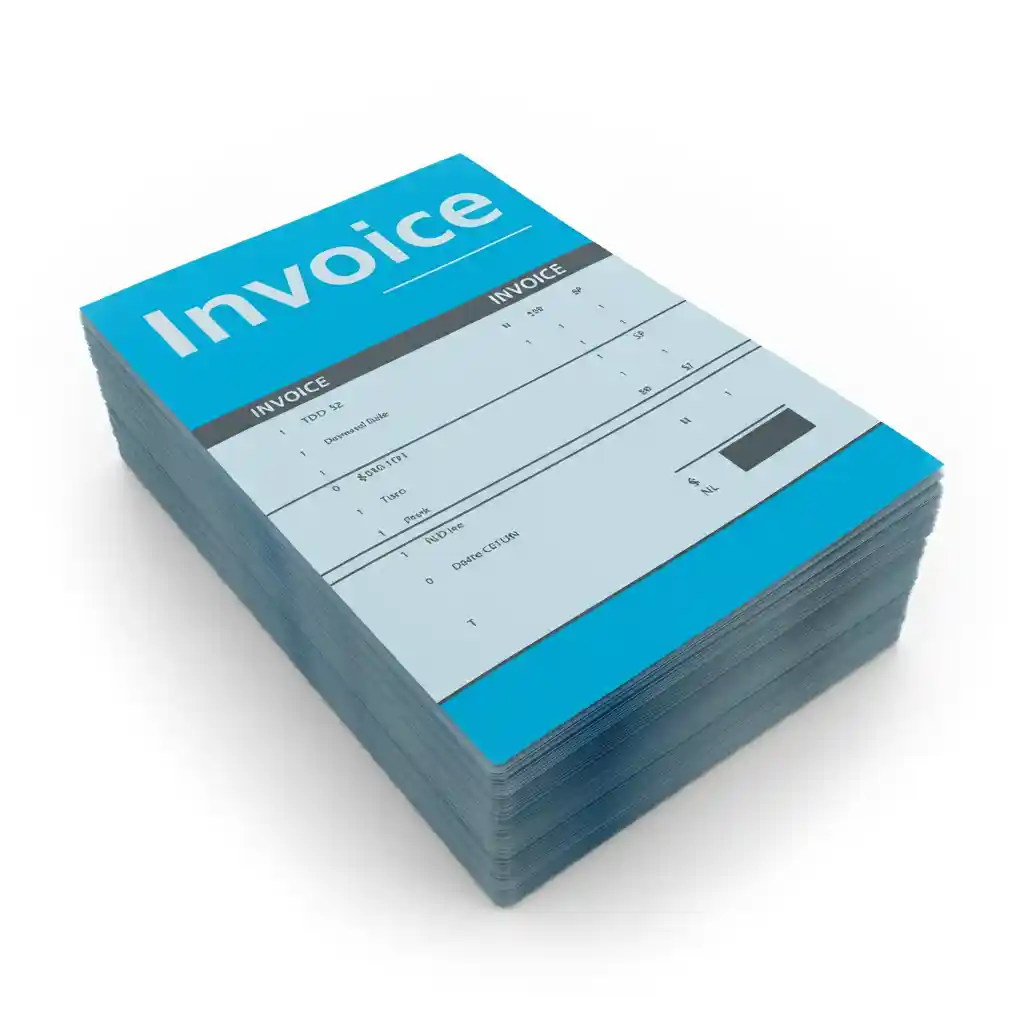How to Get a Car Loan with No Down Payment in USA: Getting a car loan with no down payment has become increasingly accessible for American consumers, offering opportunities for individuals who need reliable transportation but lack substantial savings for upfront costs. Understanding how to navigate zero-down auto financing successfully requires knowledge of available programs, qualification requirements, and strategic approaches to securing favorable terms.
Stay organized as you grow. Use ProInvoice to manage billing and client relationships with ease.
No down payment car loans eliminate the traditional barrier of requiring 10-20% upfront payment, making vehicle ownership accessible to recent graduates, first-time buyers, and individuals rebuilding their financial standing. However, zero-down financing typically involves higher monthly payments, extended loan terms, and potentially higher interest rates compared to traditional auto loans with substantial down payments.
The landscape of no down payment auto financing includes manufacturer incentive programs, specialized lenders focusing on alternative credit profiles, and traditional financial institutions offering promotional programs. Success in securing zero-down financing depends on understanding lender requirements, optimizing your financial profile, and demonstrating stable income sources that support loan repayment capability.
For business owners and freelancers seeking vehicle financing, maintaining professional financial documentation through reliable systems, including organized invoice management platforms, helps demonstrate income stability and improves qualification chances for favorable auto loan terms.
Understanding No Down Payment Auto Financing
How Zero-Down Car Loans Work
No down payment car loans finance 100% of the vehicle’s purchase price, eliminating upfront cash requirements while incorporating the full amount into monthly payments. This approach increases the loan principal and extends repayment terms, typically resulting in higher total interest costs over the loan’s lifetime.
Lenders offering zero-down financing typically require stronger credit profiles, stable employment history, and demonstrated ability to handle higher monthly payments. The absence of a down payment increases lender risk, as borrowers immediately enter “upside-down” equity positions where loan balances exceed vehicle values.
Zero-down loans often include gap insurance requirements to protect both borrowers and lenders against total loss situations where insurance settlements don’t cover outstanding loan balances. Understanding these additional costs helps borrowers make informed decisions about total financing expenses.
Stay organized as you grow. Use ProInvoice to manage billing and client relationships with ease.
Types of Zero-Down Auto Financing Programs
Manufacturer Incentive Programs: Auto manufacturers frequently offer zero-down financing promotions to stimulate sales, particularly for new vehicle inventory or model-year transitions. These programs often feature competitive interest rates but may restrict vehicle selection to specific models or trim levels.
Dealership Promotional Financing: Car dealerships partner with multiple lenders to offer zero-down options, sometimes absorbing down payment costs through higher vehicle prices or extended warranties. These arrangements require careful analysis to ensure overall value.
Subprime Lender Programs: Specialized lenders focusing on borrowers with challenged credit often offer zero-down options with higher interest rates and additional fees. While accessible, these programs require careful evaluation of total costs and terms.
Credit Union Special Programs: Many credit unions offer member-exclusive zero-down financing with competitive rates and flexible terms. Credit union membership requirements vary but often provide better terms than traditional banks for qualified members.
Stay organized as you grow. Use ProInvoice to manage billing and client relationships with ease.
Qualification Requirements and Credit Considerations
Credit Score Requirements for Zero-Down Loans
Most zero-down auto loan programs require credit scores of 650 or higher, though some specialized lenders accommodate lower scores with adjusted terms and rates. Prime credit borrowers (720+ credit scores) typically access the most favorable zero-down programs with competitive interest rates.
Borrowers with credit scores below 650 may still qualify through subprime lenders, but should expect higher interest rates, additional fees, and more restrictive loan terms. Improving credit scores before applying can significantly impact available options and total financing costs.
Recent credit events like bankruptcies, foreclosures, or significant delinquencies may disqualify borrowers from zero-down programs regardless of current income levels. Understanding these restrictions helps set realistic expectations during the application process.
Income and Employment Verification
Zero-down auto loans require comprehensive income verification to ensure borrowers can handle higher monthly payments without down payment equity cushions. Lenders typically require proof of stable employment for at least 12-24 months with consistent or increasing income trends.
Traditional Employment: W-2 employees must provide recent pay stubs, employment verification letters, and tax returns demonstrating stable income sources. Lenders prefer borrowers with tenure at current employers and career progression indicators.
Self-Employed and Freelance Borrowers: Independent contractors, freelancers, and business owners face additional documentation requirements including tax returns, profit and loss statements, and bank statements demonstrating consistent income flows. Professional financial management, including organized invoicing systems like those available through comprehensive invoice platforms, helps demonstrate business stability and income reliability.
Alternative Income Sources: Some lenders consider alternative income including disability benefits, retirement distributions, and investment income, though documentation requirements vary significantly.
Debt-to-Income Ratio Considerations
Most zero-down auto lenders require debt-to-income ratios below 40-45%, though some may accept higher ratios with compensating factors like substantial savings or excellent credit histories. The higher monthly payments associated with zero-down financing make DTI calculations particularly critical.
Calculate your projected DTI including the new auto payment before applying, ensuring comfortable payment capacity while maintaining other financial obligations. Consider potential changes in income or expenses that could affect your ability to maintain payments throughout the loan term.
Lenders and Programs Offering Zero-Down Financing
Traditional Banks and Financial Institutions
Major banks including Chase, Wells Fargo, and Bank of America occasionally offer zero-down auto loan promotions, particularly for existing customers with strong banking relationships. These programs typically feature competitive rates but may have restrictive qualification requirements.
Community banks and regional institutions sometimes offer more flexible zero-down programs with personalized underwriting approaches. Building relationships with local bankers can provide access to programs not widely advertised.
Online banks and fintech lenders increasingly offer zero-down auto financing with streamlined application processes and competitive rates for qualified borrowers. These platforms often provide quick pre-approval decisions and transparent pricing.
Credit Unions and Member Organizations
Credit unions frequently offer the most competitive zero-down auto loan terms for members, with lower interest rates and more flexible underwriting compared to traditional banks. Many credit unions also provide financial counseling and education to help members succeed with their financing.
Federal Credit Unions: Navy Federal, Pentagon Federal, and other large federal credit unions offer comprehensive auto loan programs including zero-down options for qualified members.
Employer Credit Unions: Many employers sponsor credit unions offering exclusive member benefits including preferred auto loan rates and terms.
Community Credit Unions: Local credit unions often provide personalized service and flexible underwriting for zero-down auto loans, particularly for members with established relationships.
Stay organized as you grow. Use ProInvoice to manage billing and client relationships with ease.
Manufacturer and Dealership Financing Programs
Captive Finance Companies: Ford Motor Credit, GM Financial, Toyota Financial Services, and other manufacturer-owned finance companies regularly offer zero-down incentive programs tied to specific vehicle models or sales events.
Dealership Partnerships: Car dealerships work with multiple lenders to offer zero-down options, sometimes structuring deals to eliminate down payment requirements through extended warranties or service contracts.
Lease-to-Purchase Programs: Some dealerships offer lease programs with purchase options that effectively eliminate down payment requirements while providing pathway to ownership.
Strategies for Securing Zero-Down Auto Loans
Optimizing Your Financial Profile
Before applying for zero-down financing, take steps to strengthen your financial profile and improve qualification chances. Pay down existing debts to improve debt-to-income ratios, correct credit report errors, and gather comprehensive income documentation.
Credit Score Improvement: Pay all bills on time, reduce credit card balances, and avoid new credit inquiries in the months before applying. Consider becoming an authorized user on family members’ accounts with excellent payment histories.
Income Documentation: Organize tax returns, pay stubs, bank statements, and other income verification documents. Self-employed borrowers should prepare profit and loss statements and consider working with accountants to present financial information professionally.
Savings Demonstration: While not required for down payments, demonstrating savings reserves shows financial stability and may improve loan terms or qualification chances.
Shopping and Comparison Strategies
Research multiple lenders and compare terms before committing to specific programs. Zero-down offers vary significantly in interest rates, loan terms, and additional fees, making thorough comparison essential for optimal outcomes.
Pre-Approval Process: Obtain pre-approval from multiple lenders to understand available terms and rates before visiting dealerships. Pre-approval provides negotiating leverage and prevents dealers from inflating financing costs.
Rate Shopping Timeline: Complete all auto loan applications within 14-45 days to minimize credit score impact, as multiple auto loan inquiries within this timeframe typically count as single inquiries for scoring purposes.
Total Cost Analysis: Compare total financing costs including interest, fees, and additional products rather than focusing solely on monthly payment amounts. Extended loan terms may reduce monthly payments while increasing total costs significantly.
Managing Higher Monthly Payments and Loan Terms
Budgeting for Zero-Down Auto Loans
Zero-down financing typically results in monthly payments 15-25% higher than equivalent loans with substantial down payments. Create comprehensive budgets accounting for these higher payments plus insurance, maintenance, fuel, and other vehicle-related expenses.
Emergency Fund Planning: Maintain emergency savings equivalent to at least three months of total vehicle-related expenses, including loan payments, insurance, and estimated maintenance costs.
Payment Scheduling: Align loan payment due dates with income receipt patterns, particularly important for freelancers or business owners with irregular income flows. Professional financial management through organized systems helps maintain payment schedules effectively.
Stay organized as you grow. Use ProInvoice to manage billing and client relationships with ease.
Understanding Loan Terms and Conditions
Zero-down auto loans often feature extended repayment terms ranging from 60-84 months, reducing monthly payments but increasing total interest costs. Understand the implications of extended terms on total financing costs and vehicle equity development.
Early Repayment Options: Ensure loans allow early repayment without penalties, providing flexibility to reduce total interest costs through additional principal payments when financially feasible.
Gap Insurance Requirements: Most zero-down loans require gap insurance protecting against total loss situations where insurance settlements don’t cover outstanding balances. Factor gap insurance costs into total financing expenses.
Refinancing Opportunities: Plan for potential refinancing opportunities as credit scores improve or market rates decline, particularly important for borrowers initially qualifying for higher-rate programs.
Special Programs and Incentive Opportunities
First-Time Buyer Programs
Many lenders offer specialized first-time buyer programs featuring zero-down options with competitive rates and flexible qualification requirements. These programs often include financial education components and ongoing support services.
College Graduate Programs: Recent college graduates may qualify for special financing programs offering zero-down options with deferred payment features or reduced rate incentives, even with limited credit histories.
Military Service Member Benefits: Active military personnel and veterans often access exclusive zero-down auto loan programs through organizations like USAA and Navy Federal Credit Union with exceptionally competitive terms.
Seasonal and Promotional Programs
Auto manufacturers and lenders frequently offer seasonal zero-down promotions tied to sales events, model introductions, or inventory management needs. Timing applications around these promotions can provide access to better terms and rates.
Model Year-End Clearance: Manufacturers often provide aggressive zero-down incentives during model year transitions to clear remaining inventory, providing opportunities for significant savings on new vehicles.
Holiday Promotional Events: Major sales events around holidays frequently feature zero-down financing promotions combined with other incentives like cash back or extended warranties.
Avoiding Common Pitfalls and Predatory Lending
Identifying Problematic Loan Terms
Some zero-down auto loan offers include unfavorable terms that can create long-term financial difficulties. Watch for excessive fees, balloon payments, or prepayment penalties that limit financial flexibility.
Yo-Yo Financing Scams: Be cautious of dealers allowing immediate vehicle possession before final loan approval, as this practice sometimes leads to demands for additional down payments or contract modifications after delivery.
Excessive Fee Structures: Some lenders offset zero down payment requirements through excessive origination fees, documentation charges, or mandatory add-on products that increase total borrowing costs significantly.
Extended Warranty Pressure: Dealers may pressure zero-down buyers into expensive extended warranties or service contracts, claiming they’re required for financing approval when they’re typically optional.
Protecting Yourself During the Process
Research lenders thoroughly using Better Business Bureau ratings, online reviews, and regulatory complaint databases before submitting applications. Legitimate lenders provide clear terms, transparent pricing, and professional customer service throughout the process.
Documentation Review: Carefully review all loan documents before signing, ensuring terms match verbal agreements and promotional offers. Don’t hesitate to ask questions or request clarification about unfamiliar terms or conditions.
Independent Financing: Consider securing independent financing before visiting dealerships to maintain negotiating leverage and avoid pressure tactics during the purchase process.
Building Long-Term Financial Success
Establishing Positive Payment History
Making consistent, on-time payments on zero-down auto loans helps build positive credit history and improves future financing opportunities. Set up automatic payments or reminders to ensure payment reliability throughout the loan term.
Consider making additional principal payments when financially feasible to reduce total interest costs and build vehicle equity faster. Even small additional payments can significantly impact total financing costs over extended loan terms.
Planning for Vehicle Replacement
Zero-down financing often results in extended periods of negative equity, where loan balances exceed vehicle values. Plan for eventual vehicle replacement by understanding equity development timelines and potential trade-in implications.
Maintenance and Care: Proper vehicle maintenance helps preserve value and extends useful life, important considerations when carrying higher loan balances relative to vehicle values.
Insurance Considerations: Maintain comprehensive coverage throughout the loan term, as gaps in coverage could result in personal liability for loan balances following total loss events.
Conclusion: Making Zero-Down Auto Financing Work
Successfully obtaining and managing a car loan with no down payment requires careful planning, thorough research, and realistic assessment of your financial capabilities. While zero-down financing provides access to vehicle ownership without substantial upfront costs, understanding the implications of higher monthly payments and extended loan terms is essential for long-term financial success.
The key to success lies in strengthening your financial profile before applying, shopping comprehensively among multiple lenders, and choosing terms that fit comfortably within your overall financial plan. Professional financial management, including organized income documentation and payment planning, significantly improves your chances of qualifying for favorable terms.
For business owners and self-employed individuals, maintaining professional financial records through reliable invoice management systems demonstrates income stability and business legitimacy, important factors in qualifying for competitive auto financing programs.
Focus on building positive payment history, maintaining adequate insurance coverage, and planning for long-term vehicle needs while managing the unique challenges of zero-down auto financing. With proper preparation and execution, no down payment car loans can provide access to reliable transportation while supporting broader financial goals and objectives.
Stay organized as you grow. Use ProInvoice to manage billing and client relationships with ease.














